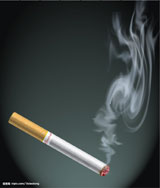 香煙的過濾嘴有什么用處
[ 2008-12-01 18:19 ]

你有沒有注意過,現(xiàn)在的香煙上都有過濾嘴,幾十年以前可不是這樣的。那后來為什么人們給煙“裝”上了過濾嘴呢?它又能起到什么作用呢?

Before the 1950s, there was no such thing as a filter-tipped cigarette(過濾嘴香煙)-- or at least nobody smoked it. People smoked unfiltered cigarettes. At that time, there was a growing perception that cigarettes might be harmful, but there was no proof. Cigarette companies spent a lot of advertising money trying to convince everyone that cigarettes were okay.
That all changed in the 1950s with the release of the first medical studies that conclusively linked smoking and lung cancer. One response to these medical studies was the mass-marketing of the filter-tip cigarette. The idea behind the filter was to screen out tar(焦油) and nicotine(尼古丁) to make the cigarette "safer." By the 1960s, filter cigarettes dominated the market.
You can see this effect continuing even today. The brands of cigarettes that are "ultra low tar and nicotine" use a technique that involves tiny, invisible perforations in the filter. As smoke flows through the filter, quite a bit of air flows through the perforations and mixes in with the smoke. With each drag, the smoker receives a lot of air and much less smoke, and therefore less tar and nicotine.
The problem with filters is that they don't actually produce the intended effect of "less." Smokers have a reason for smoking: Their bodies need nicotine. Smokers will inhale the amount of smoke necessary to get the dose of nicotine their bodies need. Several of the pages in the links below talk about conscious and unconscious steps smokers take to thwart filters and get nicotine.
The easiest way to avoid all of these problems is to avoid smoking in the first place -- that way your body never becomes dependent on nicotine. If you're already addicted, an alternative is to get the nicotine through some mechanism other than cigarettes, such as nicotine gum and patches. That way, at least you eliminate the tar.
(來源:howstuffworks網站 實習生許雅寧)
我要了解更多趣味百科知識
|